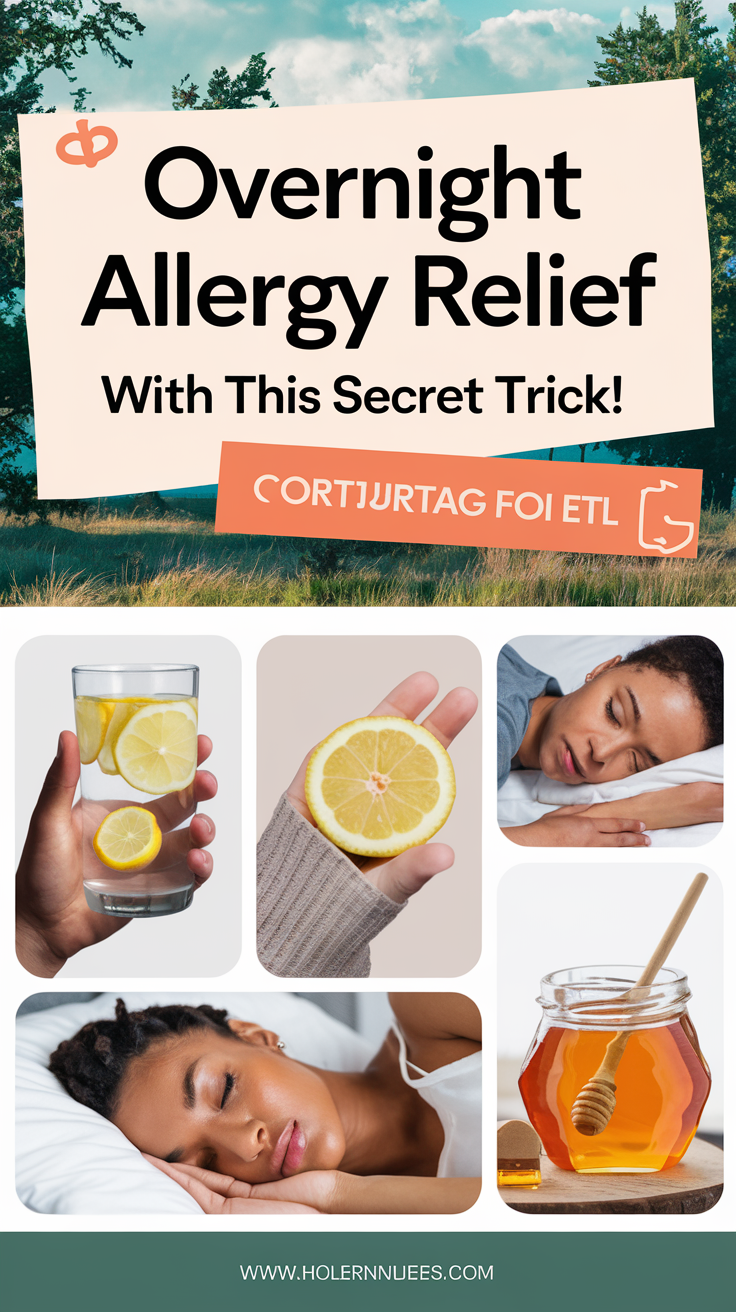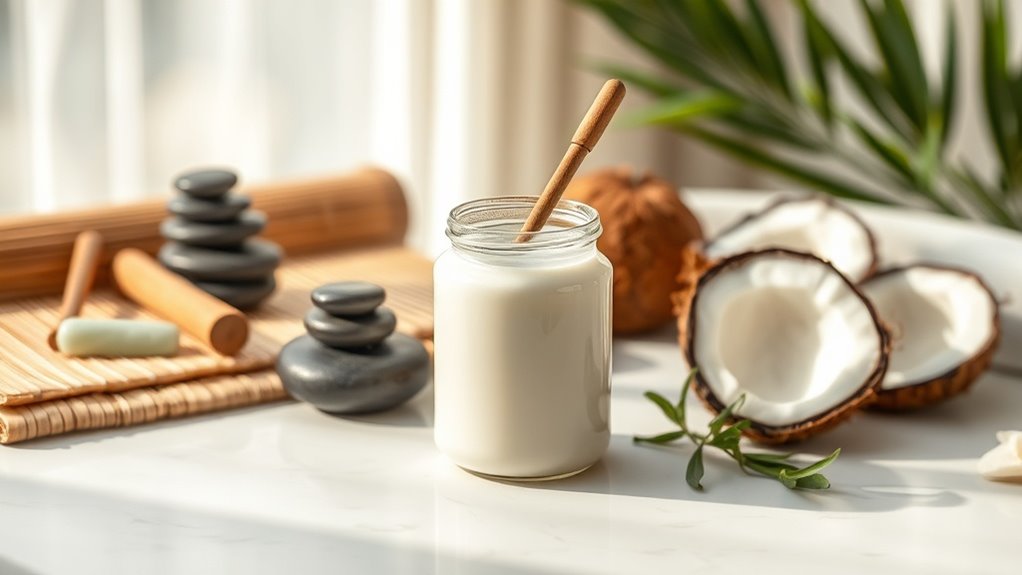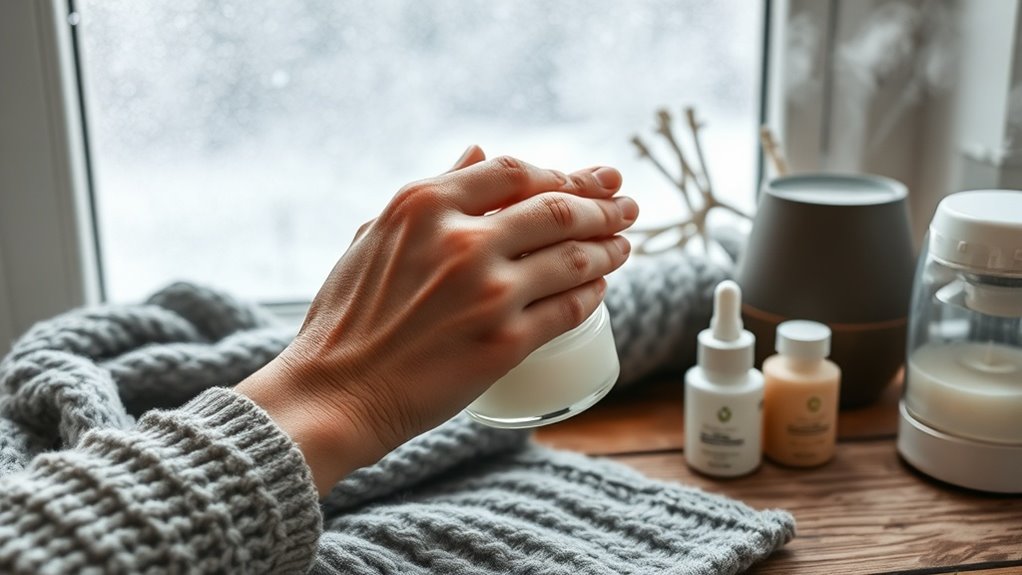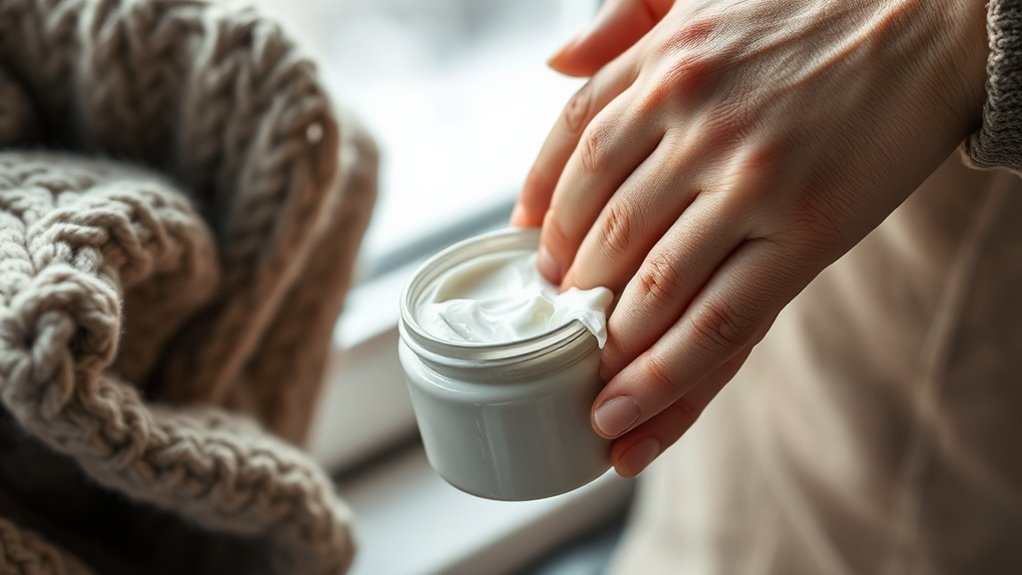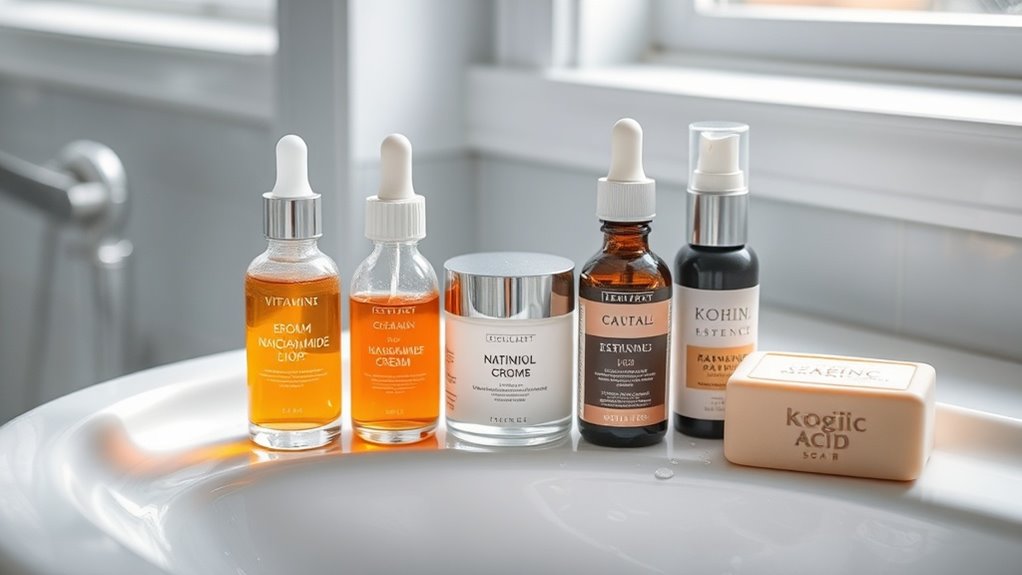Overnight Allergy Relief With This Secret Trick!
You’ll find instant relief from nighttime allergies by combining three powerful strategies. First, take antihistamines before bed when your cortisol levels naturally dip. Second, run a HEPA air purifier in your bedroom to remove 99.9% of airborne allergens. Third, elevate your head while sleeping to prevent mucus buildup. This triple-action approach targets your symptoms at their peak, but there’s an even more effective way to maximize your results.
Key Takeaways
-
Take antihistamines before bedtime when cortisol levels are lowest to effectively block overnight allergy symptoms.
-
Mix apple cider vinegar with warm water and honey before bed to reduce mucus production naturally.
-
Practice the 4-7-8 breathing technique for 5-10 minutes before sleep to clear airways and reduce congestion.
-
Create a protective barrier using hypoallergenic pillowcases and position a HEPA air purifier near your bed.
-
Combine eucalyptus oil diffusion with chamomile tea consumption an hour before bed for enhanced breathing support.
Understanding Nighttime Allergies
While many people experience allergies throughout the day, nighttime allergies can be particularly disruptive to your sleep and overall health. You’re not alone if you find yourself tossing and turning due to congestion, sneezing, or itchy eyes when trying to rest.
Nighttime allergies often worsen because you’re lying down, which can increase mucus accumulation in your airways. Your bedroom may also harbor common triggers like dust mites, pet dander, and pollen that’s settled on your clothes or hair during the day. Understanding these factors is essential when seeking effective allergy relief remedies.
You’ll notice symptoms tend to peak between 4 AM and 6 AM when your body’s natural cortisol levels are lowest, making you more susceptible to allergic reactions. This knowledge helps you better time your medication and preventive measures.
The Science Behind Overnight Relief
When your body encounters allergens, it releases histamines and other chemical mediators that trigger inflammation and symptoms. These chemicals cause your nasal passages to swell, your eyes to water, and your throat to feel scratchy – especially at night when you’re lying down.
You’re not alone in seeking nighttime relief. Your body naturally produces cortisol, an anti-inflammatory hormone that peaks in the morning and dips at night.
That’s why you’ll notice your allergy symptoms often worsen after sunset. The key to overnight relief lies in working with your body’s natural rhythm. By taking an antihistamine before bed, you’ll block the chemical cascade that causes your symptoms, allowing your body’s healing processes to work more effectively while you sleep.
Essential Bedroom Setup Changes
Making targeted changes to your bedroom can amplify the effectiveness of nighttime allergy treatments.
Start by investing in hypoallergenic pillowcases and bedding to create a barrier against dust mites. You’ll want to keep your windows closed during high pollen periods and run an air purifier with a HEPA filter to trap airborne allergens.
Position your bed away from air vents to avoid direct exposure to circulating particles. Remove carpet if possible, or vacuum it frequently with a HEPA-equipped vacuum.
Don’t forget to wash your bedding weekly in hot water and keep pets out of your sleeping area.
Consider using a dehumidifier to maintain ideal humidity levels between 30-50%, which helps prevent mold growth and dust mite proliferation.
Air Purification Strategies
Because effective air purification plays a crucial role in managing nighttime allergies, you’ll need a multi-layered approach to clean your indoor air. By implementing proven strategies, you’ll join countless others who’ve transformed their bedrooms into allergy-free sanctuaries.
| Strategy | Benefit | Implementation |
|---|---|---|
| HEPA Filtration | Removes 99.9% of particles | Run purifier 24/7 on auto mode |
| UV-C Technology | Kills airborne bacteria | Place unit 6ft from bed |
| Activated Carbon | Eliminates odors & VOCs | Replace filters quarterly |
Don’t forget to position your air purifier strategically – between the door and your bed creates ideal airflow. You’ll notice the biggest improvement when you combine these methods with regular cleaning and proper humidity control.
Bedding Material Selection
The right bedding materials act as your final defense against allergens, working alongside your air purification system.
Choose hypoallergenic covers made from tightly woven fabrics like microfiber or organic cotton to create a barrier against dust mites and pollen.
You’ll want to invest in dust-mite-proof encasements for your pillows, mattress, and comforter.
Pre-Sleep Cleansing Ritual
While your bedding creates a clean sanctuary, establishing a pre-sleep cleansing ritual can greatly reduce nighttime allergy symptoms.
Start by taking a warm shower before bed to wash away pollen, dust, and other allergens that have collected on your skin and hair throughout the day.
Change into fresh pajamas that haven’t been exposed to outdoor allergens. You’ll want to keep a separate set just for sleeping.
Next, gently rinse your nasal passages with a saline solution to flush out irritants and help you breathe easier through the night.
Don’t forget to remove your contacts and wash your face thoroughly, paying special attention to your eyes and eyelashes where allergens often accumulate.
These simple steps will help you join the ranks of allergy sufferers who’ve discovered nighttime relief.
Natural Remedy Combinations
Natural remedies working together can create powerful relief for overnight allergy symptoms.
You’ll find that combining local honey with ginger tea creates a soothing duo that fights inflammation while you sleep. Add a few drops of eucalyptus oil to your diffuser and pair it with chamomile tea for a calming, decongestant effect that helps you breathe easier.
For best results, mix apple cider vinegar with warm water and a spoonful of local honey 30 minutes before bed. This trusted combination helps reduce mucus production and boosts your immune system overnight.
You can also blend nettle tea with peppermint for a natural antihistamine effect. These time-tested remedy pairs work while you rest, so you’ll wake up feeling refreshed and symptom-free.
Humidity Control Methods
Managing indoor humidity levels plays a crucial role in reducing nighttime allergy symptoms. You’ll want to keep your bedroom’s humidity between 30-50% to prevent dust mites and mold from thriving in your sleep environment.
Install a high-quality dehumidifier in your bedroom to remove excess moisture during humid seasons. In dry winter months, you’ll need a humidifier to add moisture to the air, preventing irritated nasal passages and dry throat.
Get a hygrometer to monitor your room’s humidity levels accurately. Don’t forget to clean or replace your humidity control devices’ filters regularly.
You can also boost their effectiveness by running a fan to circulate the treated air throughout your room. These simple adjustments will help you breathe easier and wake up feeling refreshed.
Pet-Free Sleep Environment
Although your pets provide comfort and companionship, keeping them out of your bedroom is essential for managing nighttime allergies. Pet dander, hair, and saliva can trigger allergic reactions, making it difficult to get restful sleep.
Create a pet-free zone by establishing new sleeping arrangements for your furry friends. Place comfortable pet beds in another room and maintain a consistent routine. You’ll find that both you and your pets will adapt quickly to this healthy boundary.
Remember to vacuum your bedroom thoroughly and wash your bedding regularly to remove any lingering pet allergens. Consider using washable allergen-barrier covers for your pillows and mattress.
While it might feel challenging at first to sleep without your pets nearby, you’ll soon notice improved breathing and better sleep quality.
Evening Diet Modifications
When you’re trying to reduce nighttime allergies, your evening meal choices play a crucial role in your body’s response to allergens.
Like many allergy sufferers, you’ll want to avoid foods that can trigger inflammation, such as dairy products and processed foods, at least three hours before bedtime.
Instead, focus on foods that naturally fight allergies. Add anti-inflammatory options like leafy greens, berries, and fatty fish to your dinner plate.
You’ll also benefit from incorporating local honey, which can help build immunity to regional pollen.
Don’t forget to stay hydrated, but taper off liquid intake as bedtime approaches to prevent congestion from post-nasal drip.
Many allergy warriors find that warm herbal tea with ginger or turmeric makes an excellent evening drink that soothes both throat and sinuses.
Aromatherapy Support
Essential oils and aromatherapy can provide natural relief from nighttime allergy symptoms. You’ll find comfort using specific scents that help clear your airways and promote better sleep. Try diffusing these oils in your bedroom about 30 minutes before bedtime for ideal results.
| Oil Type | Benefits | Usage Method |
|---|---|---|
| Eucalyptus | Clears sinuses | Diffuser/Steam |
| Lavender | Calms inflammation | Pillow spray |
| Peppermint | Eases breathing | Chest rub |
| Tea Tree | Fights allergens | Room mist |
When you’re choosing oils, make sure they’re 100% pure and therapeutic grade. Start with just one oil to test your sensitivity, then create custom blends once you know what works best for your symptoms. You’ll join countless others who’ve discovered the soothing power of aromatherapy for allergy relief.
Breathing Techniques for Better Sleep
Simple breathing exercises can transform your nightly battle with allergy symptoms into peaceful sleep.
Start by lying comfortably in bed and practicing the 4-7-8 technique: inhale through your nose for 4 seconds, hold for 7 seconds, then exhale through your mouth for 8 seconds. You’ll join countless others who’ve found relief through this trusted method.
Another effective technique is alternate nostril breathing.
Close your right nostril with your thumb, inhale through your left nostril, then close both nostrils. Release your thumb and exhale through your right nostril. Switch sides and repeat.
This ancient practice helps clear nasal passages and reduces nighttime congestion.
Try these breathing exercises for 5-10 minutes before bedtime to naturally ease your allergy symptoms and drift into restful sleep.
Traditional Chinese Medicine Approach
Traditional Chinese Medicine (TCM) offers time-tested remedies for managing overnight allergy symptoms.
You’ll find that practitioners often recommend specific herbs like magnolia flower, chrysanthemum, and Chinese skullcap to naturally reduce inflammation and calm your immune system’s response.
TCM wisdom suggests taking these herbs as a tea about an hour before bedtime.
You’ll want to pair this with acupressure points that target your sinuses – try pressing the points between your eyebrows and on either side of your nose for 30 seconds each.
Many in our TCM community also swear by the cooling properties of white pear and mint teas to balance your body’s energy.
Remember to avoid dairy and cold foods in the evening, as they’re known to increase mucus production according to TCM principles.
Herbal Tea Recommendations
Building on ancient remedies, several modern herbal teas offer powerful relief for nighttime allergy symptoms.
You’ll find that nettle tea reduces inflammation while butterbur tea helps ease nasal congestion. For those seeking natural antihistamine effects, rooibos tea’s quercetin content makes it a perfect bedtime choice.
Try combining peppermint and chamomile for a soothing blend that opens airways and promotes restful sleep. If you’re dealing with sinus pressure, ginger tea with a touch of local honey can provide welcome comfort.
For best results, drink your chosen tea about an hour before bed, allowing time for the beneficial compounds to work their magic.
You’re joining countless others who’ve discovered these time-tested solutions for peaceful, allergy-free nights.
Window and Door Management
While pollen counts typically peak during daylight hours, managing your home’s entry points becomes essential for overnight allergy relief.
Keep your windows closed during the early morning and late afternoon when pollen levels surge. If you’re craving fresh air, open windows between 10 AM and 3 PM, when counts are usually lower.
Don’t forget your doors – they’re pollen pathways too. Install weather stripping to seal gaps, and consider using a door sweep to block unwanted particles.
When you do venture outside, change clothes immediately upon returning home to avoid tracking allergens into your bedroom.
Many allergy sufferers find that installing HEPA air purifiers near windows and doors provides an extra layer of protection against sneaky pollen that manages to slip inside.
Sleep Position Optimization
Your sleep position plays a key role in managing nighttime allergy symptoms, working alongside your careful window and door management. To minimize congestion and sinus pressure, elevate your head with an extra pillow, keeping it at a 30-45 degree angle.
This position helps drain mucus and reduces postnasal drip that can trigger coughing.
If you’re dealing with eye allergies, try sleeping on your back to prevent pollen and other irritants from settling in your eyes.
Side sleeping can cause one nostril to become blocked, so if you prefer this position, switch sides regularly throughout the night.
Many allergy sufferers find relief by slightly propping up the head of their mattress with bed risers, creating a gentle slope that promotes better breathing.
Tracking Your Allergy Symptoms
Keeping a detailed symptom diary can revolutionize how you manage your allergies at night. You’ll discover patterns that help you take control of your wellness journey alongside others who share similar challenges.
| Time | Symptom | Severity |
|---|---|---|
| 8 PM | Sneezing | Mild |
| 10 PM | Congestion | Severe |
| 12 AM | Itchy Eyes | Moderate |
| 2 AM | Coughing | Severe |
| 4 AM | Wheezing | Mild |
Track your symptoms consistently for at least two weeks to identify triggers and peak discomfort times. Note the severity, timing, and any potential triggers like open windows or pet exposure. Share this information with your healthcare provider to develop a targeted treatment plan that works specifically for your nighttime allergy relief needs.
Morning Recovery Protocol
After tracking your nighttime symptoms, a strong morning routine becomes the next essential step in managing allergies.
You’ll want to start by rinsing your sinuses with a neti pot or saline spray to flush out lingering allergens and reduce inflammation.
Next, hop in a steamy shower to help clear your airways and wash away any pollen that’s settled on your skin or hair overnight.
Don’t forget to change your pillowcase – it’s likely covered in the allergens that triggered your symptoms.
While you’re getting dressed, run an air purifier in your bedroom to clean the air before tonight.
Finally, sip some warm herbal tea with honey to soothe your throat and boost your immune system.
These simple morning habits will set you up for a better day ahead.
Frequently Asked Questions
Can Allergy Medications Interact With My Existing Prescription Sleep Aids?
You’ll need to check with your doctor or pharmacist about combining allergy meds with sleep aids since they can interact dangerously, causing excessive drowsiness and other serious side effects.
How Long Should I Wait Before Seeing Improvements With This Method?
You’ll typically notice improvements in allergy symptoms within 1-3 days. Don’t give up if it’s not immediate – many of us need time to see the full benefits.
Will This Approach Work for Both Indoor and Outdoor Allergies?
You’ll find relief for both indoor and outdoor allergies this way. Whether it’s pollen, dust, pet dander, or mold, this method helps your body naturally build resistance to allergens.
Is This Method Safe for Pregnant Women and Nursing Mothers?
You’ll want to check with your healthcare provider before trying any new allergy treatments during pregnancy or nursing. They’ll help guarantee it’s completely safe for you and your baby.
Can Children Follow These Overnight Allergy Relief Techniques Safely?
You’ll want to check with your child’s pediatrician before trying any allergy relief techniques. Kids’ bodies are more sensitive, and what works for adults isn’t always safe for little ones.
